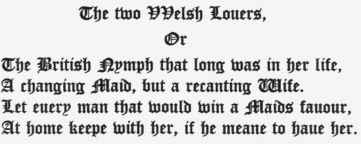A PEPYSIAN GARLAND - online book
Black-letter Broadside Ballads Of The years 1595-1639
| Share page | Visit Us On FB |
|
37 |
||
|
Two Welsh lovers
Pepys, i, 270, B.L., four woodcuts, four columns. The last stanza and the colophon are badly mutilated: the gaps have been filled in by guess. There can, however, be no doubt that the torn signature was that of Martin Parker, though the ballad has not before been given in any list of his works. The date is after December 14, 1624, when the ballad of "The Blazing Torch" {Roxburghe Ballads, 1, 418), for which the tune is named, first appears in the Stationers' Register (Arber's Transcript, iv, 131).
Due gzvin, so Professor F. N. Robinson, of Harvard, kindly informs me, is the Welsh exclamation Duw gzoyn, equivalent to "Good Lord" or "Good God." The ballad may be quoted in Fletcher's Monsieur Thomas, iv, iv, where Lancelot says: "Oh, Deu guin! Can you deny you beat a constable Last night?"1 There is in the Pepys Collection (1, 451) a ballad written in Welsh—"Byd Y bigail [i.e. "Byd y bugail" = "The Shepherd's World"?]. . .to a daintie new tune. . .Terfyn R.H. Printed by A.M. for H. G[osson]."
 To the tune of the Blading Torch.
i AS late I walkt the Meades along, where Seuerns streames did glide; I heard a mournfull Shepherds tong, and him at last espide.
1 The date of Monsieur Thomas is uncertain. It was first printed in 1639. The appearance of Due gzvin here may indicate merely that that phrase was in Elizabethan slang use. |
||
|
212 |
||